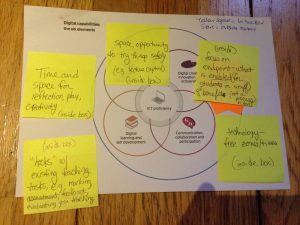As part of the framework project in 2015 I was lucky enough to have conversations with key people in many of the professional organisations in UK HE and FE. It was great to find so much interest in the six elements model and so many different ideas for embedding it into practice.
 In addition to updated digital profiles for teachers in different sectors, we have worked with the HEA to produce a new digital lens on the UK PSF. This will help teaching staff build evidence of their digital capabilities while meeting the requirements of HEA-accredited courses or individual applications for HEA fellowship. It can also support the embedding of digital activities into accredited courses (we will soon be releasing other curriculum resources too). This builds on an earlier digital lens, coordinated by SEDA, which included links to content (Jisc/third party) and to a number of useful case studies from professional bodies (not updated for this version).
In addition to updated digital profiles for teachers in different sectors, we have worked with the HEA to produce a new digital lens on the UK PSF. This will help teaching staff build evidence of their digital capabilities while meeting the requirements of HEA-accredited courses or individual applications for HEA fellowship. It can also support the embedding of digital activities into accredited courses (we will soon be releasing other curriculum resources too). This builds on an earlier digital lens, coordinated by SEDA, which included links to content (Jisc/third party) and to a number of useful case studies from professional bodies (not updated for this version).
 Another piece of work I carried out with the SEDA executive last year mapped the SEDA values to the digital domain, asking whether the digital revolution in education throws up new ethical questions, and whether SEDA’s existing values base is fit for purpose. The answer seems to be ‘yes, but…’ educators must remain aware of the new contexts in which they are being asked to practice. The same document offers 13 scenarios for discussion – for example by applicants for SEDA senior and principle fellowship.
Another piece of work I carried out with the SEDA executive last year mapped the SEDA values to the digital domain, asking whether the digital revolution in education throws up new ethical questions, and whether SEDA’s existing values base is fit for purpose. The answer seems to be ‘yes, but…’ educators must remain aware of the new contexts in which they are being asked to practice. The same document offers 13 scenarios for discussion – for example by applicants for SEDA senior and principle fellowship.
 An employability lens on the 6 elements was produced in consultation with the Association of Graduate Career Advisory Services (the professional body for careers and employability staff) and the Centre for Recording Achievement. James Clay presented this at the AGCAS conference in September. Careers and employability advisers are often at the forefront of helping students to develop social media skills and a positive digital profile. They are also key to managing several key performance metrics, particularly for universities, and so have developed data literacies that are important to the organisation overall. Look out for an updated version of this lens very shortly as part of a release of resources for curriculum teams.
An employability lens on the 6 elements was produced in consultation with the Association of Graduate Career Advisory Services (the professional body for careers and employability staff) and the Centre for Recording Achievement. James Clay presented this at the AGCAS conference in September. Careers and employability advisers are often at the forefront of helping students to develop social media skills and a positive digital profile. They are also key to managing several key performance metrics, particularly for universities, and so have developed data literacies that are important to the organisation overall. Look out for an updated version of this lens very shortly as part of a release of resources for curriculum teams.
In the last few months I’ve done new work with professional bodies, particularly on the digital capability profiles. In the next few posts we’ll hear from Maren Deepwell of the Assocation for Learning Technologies about developing the new Learning technology professional mapping, from Jane Secker of CILIP about the revised Library and information professional profile, and from Gillian Fielding of UCISA. There is also new work in the pipeline with health educators, researchers (via the parallel Jisc challenge on Research Skills), with professional staff in different roles, and with teaching staff in FE, skills and apprentice learning.
Follow #digitalcapability for more news, and look for outcomes of the Digital Capabilities Community Launch Event next week.
